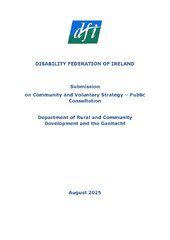DFI’s Submission on the new Community and Voluntary Strategy
Issued on August 14 2025
DFI made a submission to inform the development of the new Community and Voluntary Strategy, through the public consultation by the Department of Rural and Community Development and the Gaeltacht .
Vision and Mission
Our submission emphasised how the current Strategy does not sufficiently prioritise the inclusion and equal participation of people with disabilities. A revised vision must embed a disability rights perspective in line with Ireland’s obligations under the UNCRPD.
A thriving community sector depends on sustained, multi-annual funding that fully covers service delivery costs. This is especially crucial for disability services, central to realising rights under Article 19 of the UNCRPD (independent living).
There’s a shortage of community development and youth workers, particularly in marginalised communities. These roles must be expanded and resourced. Training on disability rights and inclusion is essential, alongside addressing structural barriers like inaccessible transport, low income, and high disability-related costs.
The pandemic highlighted the sector’s critical role. Future strategy must take a preventative approach to emergencies, as required under Article 11 of the UNCRPD. Government must also meet its obligations under Article 4.3 by ensuring Disabled Persons Organisations (DPOs) have a say in relevant policies.
Context
Emerging global and national challenges— climate change, conflict, far-right politics, economic instability— disproportionately affect marginalised communities, including disabled people. Now more than ever, a commitment to community inclusion, participation, and resilience must be matched by proper investment and political will.
The sector, relied on to deliver key services, remains under-resourced. The new Strategy must clearly commit to protecting and resourcing community and voluntary organisations, recognising them as vital to Ireland’s social fabric.
Strategic Objectives
DFI also made recommendations for new strategic objectives including:
- Intersectional inclusion across all community initiatives, addressing how disability intersects with other identities.
- Human rights-based approach to disability inclusion at local level, as explored in DFI’s Bridging the Gap report.
- Accessibility of services, infrastructure and information, in line with the UNCRPD and EU obligations.
Strategic Actions
New actions should include:
- A Disability Inclusion Strategy in each county, coordinated by a local Disability Inclusion Officer on each LCDC.
- A full-time Access Officer in every local authority.
- Commitment to accessible engagement, including accessible formats, communication, and physical access.
- Cross-departmental collaboration and alignment with relevant strategies.
- A SMART monitoring and review process to assess progress and redirect actions as needed.

